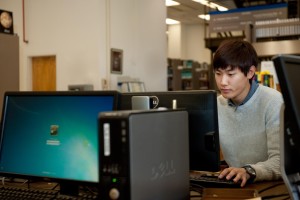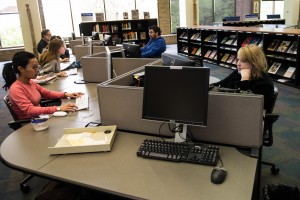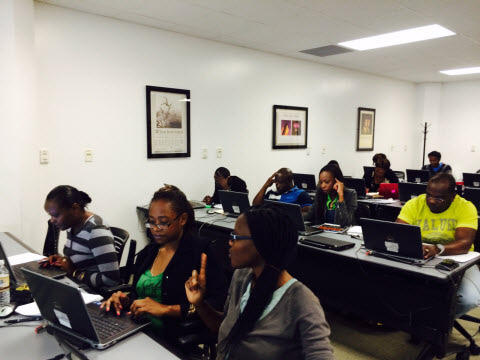
One of the more gratifying aspects of being a subject librarian is witnessing students actually using the resources you introduced to them during an instruction session. Back in February of this year, Regina Hughes, the director Texas Business Foundations Program (Texas BFP) offered the opportunity to conduct an information resources session for her class. With no hesitation, I accepted the invitation and with Gina Watts, the business GRA prepped for the session.
The Texas BFP, which is designed to give undergraduate students of any discipline a fundamental background in business, is one of the largest and widely recognized certificate and minor programs at The University of Texas. The session covered all the business resources offered through the UT Libraries, with an emphasis upon how and when to use specific databases.
At the end of the semester the students get a chance to show off their entrepreneurial knowledge and skills to a panel of judges who will determine, theoretically, if their projects are worthy of funding. This semester Gina and I sat as judges for the first time and were handed the responsibility of reviewing the projects of half a dozen teams. Joining the panel of judges was fantastic. The students were all well prepared for their presentations, and had clearly been using (and correctly citing) the business resources. Since we generally never see the final product after a consultation for an assignment, it was great to see their success. It was also nice for Gina be more involved with the business school, because many GRA positions do not allow for much faculty interaction.
The presentations were brief, each group had only five minutes to describe the product or service; the target market, how they would make a profit, estimate the return-on-investment, as well as ask for a definitive amount of funding to launch the venture.
The ideas ranged from providing dental care to low-income families by acting as mediators and facilitating contact with dental professionals willing to provide care, pro bono. Another group developed a service that would provide fresh ingredients for preparing desserts delivered to your door. The standout was the proposal to develop a software application, which would allow students to develop budgets and manage their finances throughout their college career. It included an option for allowing parents monitor the process, which was very interesting.
The pace was fast and exciting. The highlight of the session was seeing the amount of business resources students had incorporated into their work. Moreover, how having access to real world databases, such as Mintel, Marketline and SimplyMap helped to prepare them for similar challenges beyond their university experience.





